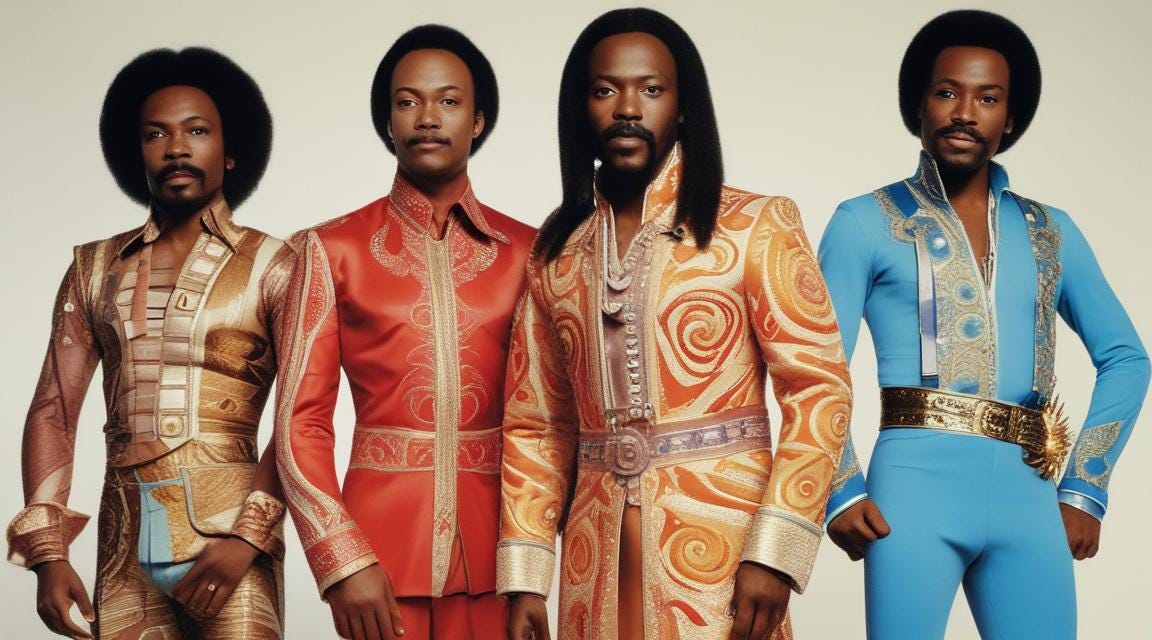Hi Friends,
Remember the 70s pop group, Earth, Wind and Fire?
Remember how they took jazz, rock, soul, funk, and disco and synthesized these diverse genres into a sound that was, well, uniquely Earth, Wind, and Fire? Enigmatic. Evoking emotions through their mystical sound and lyrics that led us to a place we’ve never been, a place we didn’t know we were seeking.
Up until I fell in love with the band’s music, I didn’t give much thought to the elements. Why, I wondered, did they call themselves Earth, Wind, and Fire?
The group's founder, Maurice Philips, and his bandmates saw their music-making and art as part of their spiritual journey. Maurice was especially interested in astrology, yoga, meditation, and mysticism, finding inspiration and insight from his astrological sign, Sagittarius.
The name Earth, Wind, and Fire was chosen to reflect the three elemental energies of his sign. Maurice believed, as does the sister science of yoga, Ayurveda, that each of us is impacted by the five elements of earth, water, fire, air, and space, and he wanted the band’s name to be a reminder of the potent energies that influence our lives. He chose Wind because, as a true musical artist, he liked the way it sounded better than Air.
Ayurveda, Your Unique Blueprint, and the Five Elements
Ayurveda is considered the first medical modality and holistic system to take an integrative approach to health and well-being. It’s often called “the science and art of life” or “the science of life and longevity”.
A foundational principle of Ayurveda is that all of life (matter), including us humans, is made up of the five elements. And that the elements influence our constitutional make-up, called dosha in Sanskrit. You can think of your dosha as your unique blueprint, which includes the five elemental energies that govern your physical, mental, intellectual, spiritual, and emotional well-being.
The Sanskrit names for the three doshas are Vata, Pita, and Kapha.
Vata's constitution is comprised of the elements of air and space.
Pita's constitution is comprised of the elements of fire and water.
Kapha’s constitution is comprised of the elements of water and earth.
The elements from an Ayurvedic/yogic perspective are a complex topic that I’ll briefly explain to illustrate how they relate to the Rasas, our nine basic emotions.
As I mentioned above, our physical body contains each of the five elements. However, because of our unique dosha, one or two of the elements will be more dominant than the others. This contributes to our personal view of life and how we interact with the world around us, including our relationships.
For example, my constitution is primarily Vata, but running a very close second is Pita. Remember, Vata is air and space, and Pita is fire and water.
Vata - air is movement with space making all the elements possible.
Pita - fire is transformative and visionary. (water)
Kapha - earth is stabalizing and water is both strong and nurturing.
It’s important to mention that the five elements in each dosha play a much greater and more complex role than I’ve listed in this essay.
My yogic practice consists not only of the poses I do on the mat and my meditation practice, but I also do my best to maintain balance in the elements. Imagine it’s a windy day. I’m aware that if outdoors for long, say gardening or hiking, the element of air within me will be disturbed and disrupted, potentially causing me to overreact to a situation with fear, worry, or anxiety. Pita imbalanced has the potential to stir emotions of anger or frustration.
Vata’s strengths are the ability to flow easily from project to project, see the bigger picture, and hold a higher vision. (air and space)
Pita’s strength is the ability to digest information, metabolize food, and transform ideas into empowered action. (fire and water)
Knowing my elemental powers and potential cause-and-effect imbalances helps me be more present and compassionate with myself. Knowing my partner’s dosha helps me to do the same.
Takeaways
Whether you’re aware of your unique dosha and what elements are predominate in your constitution or not, earth, water, fire, air, and space are at play in your life.
Knowing your dosha and what elemental energies are a primary influence is a great resource for wholenes - physical, mental, emotional, and spiritual health.
When your primary constitutional elements are out of balance, either weakened from illness or stress or overstimulated and affected by the environment or life circumstances, your emotional awareness and clear response will be compromised.
Knowing your dosha, your energetic and physical blueprint, will support your overall well-being and help you live your life with more vitality and purpose.
Click the link below to learn more and take my complimentary dosha assessment.
Let me know if you have any questions after taking it.
If you enjoyed this post, would you be so kind as to comment, like it with a 💙 or share it with a friend? It really really helps and it really really means a great deal to me. Thank you!
With love and appreciation, Paulette
The last of the series on the Nava Rasas will explore the gem, sometimes hidden, in each of the nine emotions.






This was great. I didn't know much about this subject. I'm so glad you included the self-exam. My readings are like yours, Vata first with Pitta a close second. Thanks, Paulette, for this exercise!